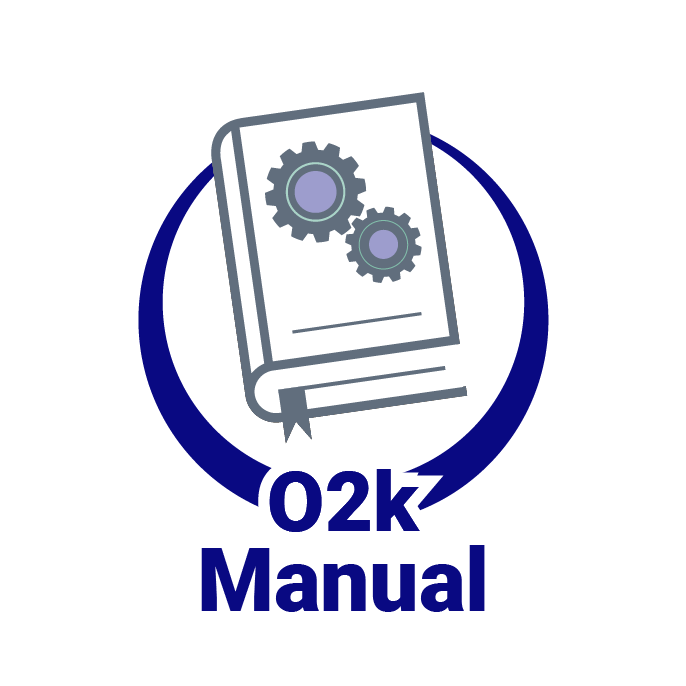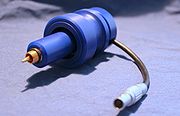From Bioblast
 |
OroboPOS-Connector |
MitoPedia O2k and high-resolution respirometry:
O2k-Open Support
Description
OroboPOS-Connector (blue POM), with male connection to OroboPOS head (POS) and with cable and male plug fitting into O2k-Main Unit.
Reference: Product details and purchase information
From OroboPOS-Connector to SmartPOS
- In the NextGen-O2k-Series XB and O2k-Series J (introduced in 2023), the OroboPOS-Connector is replaced by the SmartPOS, eleminating the problem of cleaning the electrical connection between sensor head and OroboPOS-Connector.
Functions
- The OroboPOS-Connector has several functions:
- It presses mechanically the POS against the Glass chamber, ensuring a tight fit.
- It connects the POS electronically to the O2k-Main unit transmitting the signal.
- In O2k Series A-C it also performs the current to voltage conversion / amplification. For Series D and upwards this function has been incorporated into the O2k-Main unit. For this reason OroboPOS connectors for Series A-C and for Series D-I are NOT interchangeable. The OroboPOS-Connector from O2k-series A-C must only be plugged into or unplugged from the O2k main unit with the O2k switched off.
- The OroboPOS-Connector has several functions:
- The OroboPOS-Connector is sensitive to damage by ESD when disconnected from the O2k-Main Unit and when the POS head is removed. Further details: MiPNet14.01_ESD-damage.
Cleaning the body of the OroboPOS-Connector
- When experimental media or electrolyte (during service of the polarographic oxygen sensor OroboPOS) leak into the mechanical part of the OroboPOS-Connector, operation of the spring mechanism may be restricted. In such cases, the body of the OroboPOS-Connector should be washed with deionized or distilled water. To do so, screw the OroboPOS head onto the OroboPOS-Connector. Make sure that the plug connecting to the O2k-Main Unit does not get wet (protect with parafilm). Rinse the body of the OroboPOS-Connector with H2O, pulling the spring-loaded part at the base several times. Salt crystals and media clogging the mechanical part are thus washed out. Wipe off the water while again pulling down the spring-loaded part.
Cleaning the electrical connections
Last update (2023-11-08): To avoid H2O from penetrating into the OroboPOS-Connector and POS head, the previously mentioned option to remove salt crystals with a paper cloth moistened with H2O is removed.
- Unscrew the OroboPOS and check the electrical connections (the thread of the OroboPOS and the gold pin of the OroboPOS-Connector).
- Remove any contaminating grease, salt crystals and moisture with a dry, fine paper cloth.
- If the thread of the OroboPOS and the gold pin of the OroboPOS-Connector are discolored or appear stained, clean repeatedly with a fine paper cloth moistened with 99.9 % ethanol until no more traces appear on the paper cloth used for cleaning. It is important to only moisten the paper cloth to avoid EtOH getting into joints which might cause a high leak current. Liquids in joints are difficult to remove and, in many cases, require service by the manufacturer.
- Always let the connections (OroboPOS head and OroboPOS-Connector) dry well before use. If the O2k is used in a humid environment or a moistened paper cloth was used for cleaning the connections, the POS-Connector and OroboPOS (without membrane) should be dried in an oven at up to 60 °C for 1-2 h. Follow the procedure with an Oxygen sensor test as a quality control of proper OroboPOS-Connector and OroboPOS performance.
Defective OroboPOS-Connector
- If the OroboPOS-Connector has been found to be the reason for a high signal at zero oxygen or a noisy signal, and repeated cleaning and drying of the electrical connections of the OroboPOS-Connector does not solve the problem, it can be sent to our electronics partner for an OroboPOS-Connector Service or needs to be replaced.
- If any parts of the OroboPOS-Connector are broken, please contact our technical support.
Additional resources
MitoPedia O2k and high-resolution respirometry: O2k hardware, O2k-Open Support, O2k-Respirometry, O2k-FluoRespirometry





